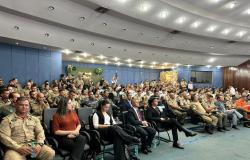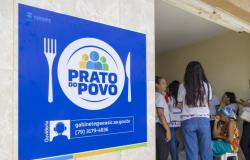SALARY DISPARITY
Indigenous teachers earn R$3,000 less than others in Bahia
In the state network, while teachers from other ethnicities receive R$4,400 for 40 hours a week, indigenous teachers have a base salary of R$1,200; disparity in salaries also affects other functions
Published on April 3, 2024 at 05:00

The salary disparity between indigenous and non-indigenous teachers exceeds R$3,000 Credit: Amanda Chung/SECBA
Under the administration of Jerônimo Rodrigues (PT), who is the first indigenous governor of Bahia, teachers with an indigenous career face a significant salary disparity. While non-indigenous teachers receive a base salary of R$4,420.55 for a workload of 40 hours per week, indigenous teachers receive only R$1,253.12. This highlights a difference of R$3,167.43 between the two groups of educators.
Indigenous teachers joined the state education network in the 2014 public examination and, since 2016, have been demanding equal pay. The career for teachers from this ethnic group was created in 2011, based on Law 12,046, and a new struggle was necessary for a competition to be held two years later. During the almost 18 years of PT governments, this was the only selection process aimed at indigenous educators. The competition took place in January 2014 and those selected to work in the 27 schools aimed at indigenous peoples only took place in September of the same year.
“There are schools where there are only indigenous (teachers) and there are others where there was a need to add non-indigenous people. We can teach in non-indigenous schools also because we are part of the Bahia state network, however, only in different cases, because we need to leave the village for other purposes”, explained Verônica Pataxó, from the Pataxó people of Coroa Vermelha, a village located in the city of Santa Cruz de Cabrália, in the Far South of Bahia.
Progression within the career of an indigenous teacher brings much lower salaries when compared to a non-indigenous teacher with the same title. Rodolfo Moreira, a teacher belonging to the Kaimbé ethnic group from the Euclides da Cunha region, reported that the disparity in his income as a director in a medium-sized school is R$2,236.26 compared to a non-indigenous director in a school of similar size .
“We receive a salary below the minimum and net salary, without any bonus, without any benefits”
Rodolfo Moreira
Teacher in the Euclides da Cunha region
“Managers, for example, receive less than any manager at another school, even though they are the same size. It doesn’t have the percentages that everyone else receives more. So, we receive a salary below the minimum and net salary, without any bonus, without any benefits, even though we are in a permanent career,” he said.
Over the years, according to him, several indigenous teachers took courses and new postgraduate degrees, but there was no salary increase. “We want to receive at least a value that is in accordance with the class. When you say: ‘I’m a member of the State government’, you have the idea that the person at least has a decent salary, has a value that they can receive decently from their work. And today we don’t feel that, we feel an indifference towards indigenous teachers”, said Rodolfo, highlighting that there are 100 permanent indigenous teachers in Bahia.
Rodolfo Moreira also said that the Bahia State Administration Secretariat (Saeb) together with the State Attorney General’s Office (PGE) and the Bahia State Education Secretariat (SEC) are discussing a new salary base for the category. The report asked the agencies about the progress of this new table of values, but did not receive any response until the closing of this edition.
“The State claims that our law does not accept training in degrees other than intercultural degrees for indigenous teachers. A course that only Uneb and Ifba offer in Bahia. This means that anyone who completed a degree, which is not intercultural, is paid as a non-licensed teacher. In other words, as a teacher he receives a minimum salary as a medium level teacher”, said indigenous teacher Arissana Braz.
Indigenous career teachers receive payment of their salary in the form of a subsidy. The value does not include salary, allowances and complementary activities. According to Arissana Braz, for complementary activities, non-indigenous teachers receive around R$600 from the state network.
The teacher also said that the Indigenous School Education Forum (Fórumeiba) has already prepared a bill to amend the 2011 legislation. A meeting was held between the Education Department and Fórumeiba last week to discuss the indigenous teachers’ claim, but they fear that as the electoral period approaches, the proposal will be forgotten and not even taken to the vote in the Legislative Assembly of Bahia (Alba).
“We are asking for changes so that teachers, both those who have an intercultural degree, specific to indigenous teachers, and others who have a degree from any public or private university, have the right to a salary as a licensed teacher”, reported Arissana.
Until the closing of this edition, Saeb, SEC and PGE had not commented on the charges for indigenous teachers.
*With guidance from editor Rodrigo Daniel Silva
Tags: Correio newspaper Indigenous teachers earn R3000 Bahia
--







